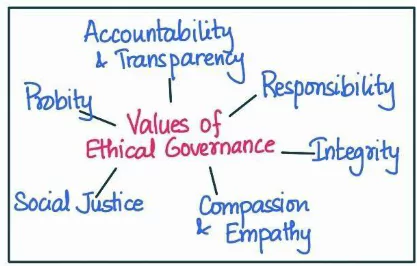Answer:
|
How to approach the question
- Introduction
- Write about ethical governance briefly.
- Body
- Write why the fundamental purpose of governance is to foster societal cohesion.
- Write the pivotal role of ethical governance in attaining societal cohesion.
- Conclusion
- Give appropriate conclusion in this regard.
|
Introduction
Ethical governance encompasses principles of integrity, transparency, and accountability in decision- making processes. Through ethical leadership, organizations and governments can foster trust, promote social responsibility, and ensure that actions align with ethical standards, fostering social cohesion.
Body
Fundamental purpose of governance is to foster social cohesion through

- Democratic Participation: It encourages active citizen participation in decision-making processes, fostering a sense of ownership and social cohesion. The successful conduct of elections in India at all levels of government showcases it.
- Cultural Preservation: Initiatives like the preservation of ancient monuments and promotion of indigenous arts and crafts in states like Rajasthan contribute to societal cohesion by valuing cultural diversity.
- Conflict Resolution: It provides mechanisms for peaceful resolution of conflicts, ensuring social harmony. The government’s efforts to resolve long-standing disputes, such as the Naga insurgency in northeastern states, contribute to societal cohesion.
- Unity in Diversity: It ensures that diverse cultural, religious, and ethnic groups coexist harmoniously. India’s federal structure enables states like Kerala, with a high literacy rate, to support education initiatives in less-developed states like Bihar.
- Equality: It combats discrimination based on caste, religion, gender, or other factors, fostering social harmony. India has implemented reservation policies to ensure equal opportunities for marginalized communities, promoting inclusivity.
Pivotal role of ethical governance in attaining societal cohesion by
- Trust-building: Ethical governance establishes trust between the government and citizens, fostering a cohesive society. Kerala is lauded for its transparent and ethical governance, leading to high levels of citizen trust exemplifies this.
- Citizen participation: It encourages citizen participation in decision-making processes, fostering a sense of ownership and social cohesion. Pune in Maharashtra has implemented participatory budgeting, to involve residents in local governance.
- Social welfare: Ethical governance prioritizes the well-being of citizens, ensuring the equitable distribution of resources and opportunities. Programs like the MGNREGA, PM KISAN SAMMAN Nidhi etc reduced poverty in rural areas.
- Civic education: It promotes civic education to instill ethical values and responsible citizenship. Maharashtra has incorporated civic education into school curricula, nurturing a sense of ethics and social cohesion among young citizens.
- Social Harmony Initiatives: The annual Ratha Yatra festival in Odisha exemplifies communal harmony as people from different backgrounds participate in the event, showcasing the role of governance in nurturing societal cohesion.
Conclusion
Thus, governance plays a crucial role in fostering social cohesion by promoting social justice, rule of law, democratic participation, cultural pluralism etc. By embracing ethical governance principles and practices, governments can create a harmonious, inclusive and cohesive society.
To get PDF version, Please click on "Print PDF" button.



Latest Comments